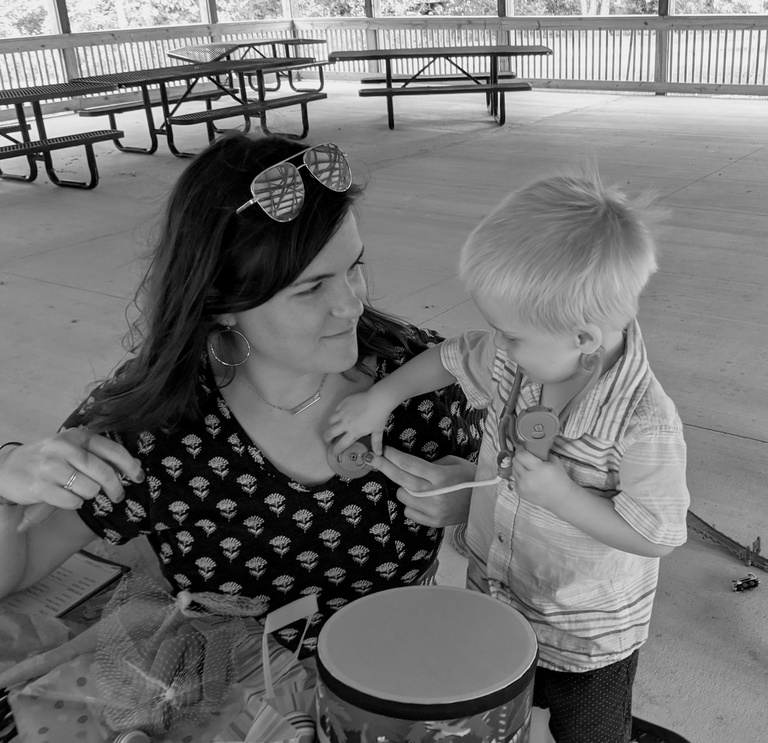The following is a reflection from Emily A. Brown, senior advisor and program coordinator for Study Abroad in International Programs at the University of Iowa.

Emily Brown with her son
Based on my unscientific poll of family, friends, and colleagues, the concept of time is something that has preoccupied our thoughts over the past year. Working long hours from home or on the front lines of the current health crisis, being separated from loved ones, and balancing the demands of school/jobs and childcare has led to a general sense of days crawling by minute by minute. However, when we think of the past 10 months or so, there is also a persistent feeling that we blinked and woke up in a different week, month, or season. Time speeds up and stands still simultaneously, leaving many of us unmoored. We struggle to create schedules and rhythms to give our weeks structure and yet also feel as though there are not enough hours in the day to get everything done. Somehow we have all the time in the world and none at all.
All this reflection on time has me thinking often of my semester in Perugia, Italy. When I studied abroad there in college, I was constantly frustrated by time. As much as I loved Italian food, art, hand gestures, and language, I was impatient for life to move faster. I complained about how long it took to run errands because store clerks seemed to be in perpetually slow motion. I was aggravated to find a shop closed when it was open at the same time the previous week. I rolled my eyes as the constant announcement that played over every train’s loudspeaker asking passengers to excuse the delay in the arrival time. I remember venting to my family about how everything in Italian society would run smoother if everyone tried a little harder to be punctual and efficient! I had it all figured out, as many 21-year-olds assume they do.

Image of Perugia, Italy
When I was in graduate school several years later, I took a course about cross-cultural communication. Rather by accident, I developed an entirely different understanding of many of the experiences I had in Italy. We learned to unpack culture (a huge and nebulous term) according to various cultural dimensions, one of which is attitude toward time. Depending on the academic source and model you consult, you will see the cultural dimension of time described in different ways. I like to envision it as a spectrum of linear versus circular time. On one end of the spectrum is a linear view of time, in which punctuality and efficiency are prized. In cultures with linear time (such as the U.S.), most people (we are making some generalizations here) are obsessed with fitting as many activities as possible into a given day. Time is finite and always moving forward. On the other end of the spectrum, you have cultures like Italy where time is more flexible. Time is given to others as a sign of respect and caring, even if it makes someone late for another engagement. Schedules exist, but there is a sense that time ebbs and flows as it should to account for important relationships (familial bonds and friendship) and rituals (like meals).
Understanding time in this way completely changed the way I remembered my semester in Italy. The seemingly inattentive store clerks weren’t slow because they didn’t care but rather because they were engaged in a meaningful conversation with an acquaintance or regular patron. The shop schedule wasn’t entirely consistent because sometimes personal commitments get in the way of work. As thankful as I was for this shift in my perspective, I also wished that I could go back to my 21-year-old self, shake her, and tell her to chill out. The world was not out to inconvenience her; she just wasn’t the center of it.
As I have moved through adulthood, I have tried to be more open-minded about time and its purpose. Spoiler alert: I don’t always succeed. Sometimes I just really need the grocery line to move more quickly or my coworkers to respond to emails within 30 minutes because, well, it would make my life more convenient. But I do remind myself that others may conceptualize time differently (there are variations even within “American culture”), and I appreciate people and cultures that don’t sacrifice their sanity at the altar of efficiency. As a single mother, I often devise complex schemes to multi-task and ensure that I’m meeting the needs of my child without the backup of another adult in our household. It’s so easy to get caught in an ever-spinning wheel of planning and tasks. However, I am also acutely aware that my time with my child, who spends about half his life with his dad, is limited. I don’t want to be so buried in my to-do lists that I forget to laugh and play and truly watch my son explore the world. It’s a constant balancing act that people seem to have a greater awareness of in this strange pandemic world. We’re all pulled in a million directions everyday but understand more than ever that spending time with each other is an irreplaceable gift. I wasn’t ready to learn that lesson when Italy tried to teach me many years ago, but I am now. I know I’m not alone. As we move forward, I hope we’ll all be more purposeful and gracious with our time. We’ll be stronger for it.